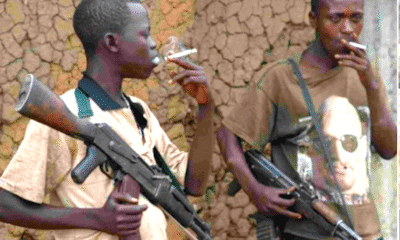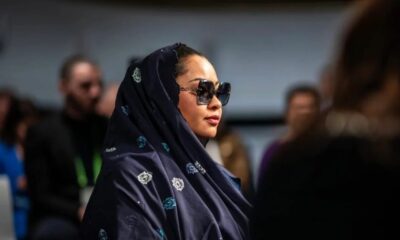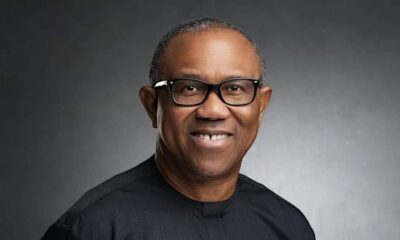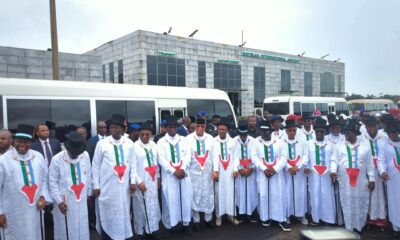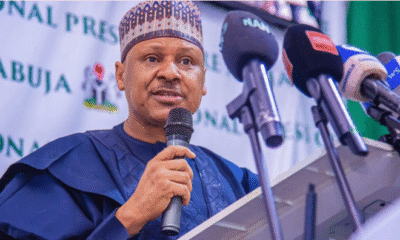
Opinion
Nigeria: Why We Must Take Flood Warnings Seriously

By Ebuka Ukoh
I woke up to the news of a five-day flood notice across 19 states in Nigeria. Now, we have just a few days left. I could not shake off the urgency in my spirit.
This isn’t just another weather update. It is a warning—one that must be heeded. As someone whose research intersects climate change, extreme weather events, and their impact on intimate partner violence and gender roles, particularly the burden on men in vulnerable communities, I know how quickly things can spiral when we do not prepare. When we know better, we must do better.
I can see myself in every skeptical or overwhelmed Nigerian. Before now, I too could have dismissed such warnings as distant or irrelevant. But the evidence is mounting, and ignorance is no longer an excuse. I have seen the aftermath of devastating floods, not just in the abstract data of research, but in real communities—Bayelsa, Lagos, Benue, Anambra, Jigawa, and many more. Entire neighborhoods submerged. Homes destroyed. Human lives lost. Livelihoods gone. What we often forget when we read these statistics are the grief, the hunger, the trauma, and the helplessness that lie beneath the numbers.
My longtime mentor who lives and works in the Modire area of Yola, the Adamawa State capital, recently shared his harrowing experience:
“By divine grace, I escaped drowning by the skin of my teeth two Sundays ago.

“In the wee hours, neighbours woke me up as they were running out with their children. I peeped through my window and saw them wading through water.
“Quickly, I put on my boxers, took a walking stick, and opened the door to follow. As they opened the main gate, more water rushed through. Then I remembered my phone and laptop and risked my life through the floods back to my apartment. There, I dived straight to where the two working tools lay on the floor. I fished them out and hurried out, leaving the door open because the rush of water wouldn’t let me close it.
“When we returned home by 8 a.m., the water had reduced to ankle level. Everything in the house was submerged or floating. We bailed out water for days. The floors are still damp because the house was built in a waterlogged area. My phone’s functionalities have been restored—not the PC’s yet.
“I work with this tab now.
“Friends and hirelings have been coming since that incident to help with cleaning and sanitising my home.”
This is not just his story—it could be anyone’s. A father. A neighbour. A student. A businesswoman. You.
To every Nigerian trying to survive in an already difficult economy, I understand. You are not indifferent—you are exhausted. And yes, many of us have learned to spiritualise our crises. We default to “God will help us.” And indeed, He will. But faith is not a substitute for preparation. Pray if you must—but, please, plan as well.
Let’s be clear on one thing: Climate change is not a Western hoax. It refers to long-term shifts in temperatures and weather patterns, primarily caused by human activities such as burning fossil fuels, deforestation, and industrial pollution. These changes lead to extreme weather events like flooding, drought, and heatwaves—events that are already shaping our everyday lives in Nigeria.
This message is for everyone: Rural and urban dwellers, policymakers, business owners, faith communities, and especially those who still think climate change is an elite or foreign concern. It is not. When rivers overflow in Lokoja, when homes are swallowed in Makurdi, when roads collapse in Calabar, it is not just an international headline. It is our people’s reality.
The Federal Government has allocated ₦6 billion in the 2025 budget specifically for erosion and flood control projects under the Economic Recovery Growth Plan (ERGP). In addition, the National Emergency Management Agency (NEMA) has received ₦10 billion to enhance its preparedness and response for the 2025 flood season. This funding is intended to support nationwide flood mitigation efforts. Please, if anybody knows where these monies are, let them speak up so we can all be enlightened.
More importantly, we must shift from crisis response to crisis prevention. That starts with education. What if governments and foundations invested in early warning systems, flood simulations in schools, local language sensitisation campaigns, and community-led climate workshops? What if we committed resources to prevention with the same urgency we show during disaster relief?
Leaders—religious, traditional, and political—must lead climate literacy campaigns. If they can mobilise people for elections and revivals, they can mobilise them to save lives. One sermon. One WhatsApp broadcast. One community meeting at a time.
And you, dear reader, have a role to play:
This is how nations are built—by collective action, not collective apathy.
Nigeria’s floods are not just the result of heavy rain. They are the product of weak planning, outdated infrastructure, urban sprawl, deforestation, a systemic lack of environmental responsibility—and maybe nonchalance. But mostly, they are the outcome of a mindset that waits until the damage is done.
Let us stop waiting.
To foundations and philanthropists: Fund education and preparedness. It is cheaper than reconstruction. To local governments: Prioritise flood mapping and drainage. And to our faith communities: Teach that Noah built the ark before it rained.
Only the living can tell the tale of what will come. Let us be among them, please.
Let us prepare, protect, and proclaim the gospel of climate responsibility—not just because it is wise, but because it is necessary. For in this struggle, as with all others, the people are not the problem. They are the solution.
And the time to act is now.
• Mr Ukoh, an alumnus of American University of Nigeria, Yola, and PhD student at Columbia University, writes from New York.
Opinion
2025 World Polio Day: Reflections on Rotary’s Humanitarian Journey — By Max Amuchie
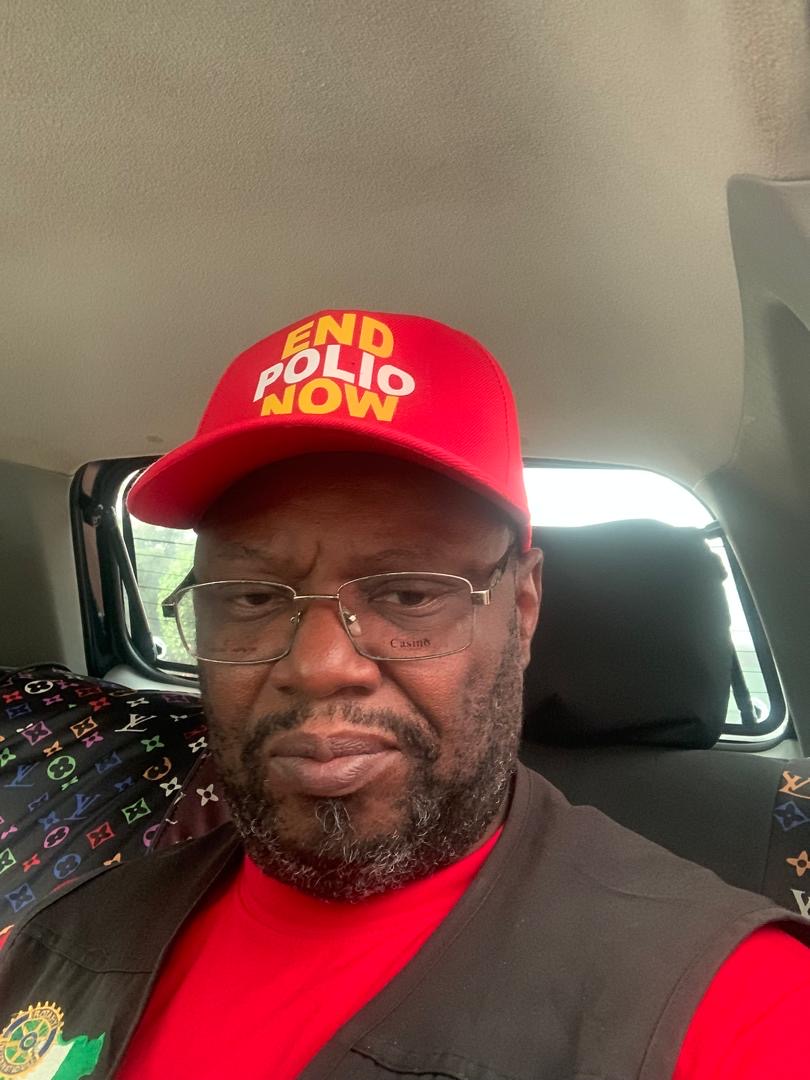
For Rotarians the world over October 24 every year is a significant day, a day set aside to mark the World Polio Day. It also serves to commemorate the birthday of Jonas Salk, the man who developed the polio vaccine. For this year District 9127 under the leadership of the District Governor, Dame (Dr) Princess Joy Nky Okoro, hosted the other five Rotary International District Governors in the country in an all-Nigeria week-long celebration that lasted from October 17 to October 25.
Rotary’s dedication to eradicating polio is one of the most significant efforts in the history of public health and it’s involvement has been a game-changer, demonstrating the power of private-sector commitment to a global health goal.
Rotary began its efforts in 1979 with a multi-year project to immunise children in the Philippines. This led to the launch of PolioPlus in 1985, which was the first and largest internationally coordinated private-sector support of any public health initiative.
In 1988, Rotary joined with the World Health Organisation (WHO), the U.S. Centres for Disease Control and Prevention (CDC), and UNICEF to launch the Global Polio Eradication Initiative (GPEI). The Bill & Melinda Gates Foundation later joined as a key partner.
Rotarians worldwide have contributed over $2.9 billion and countless volunteer hours to the eradication effort. They also play a crucial role in advocating for and securing more than $11 billion in funding from donor governments.
Beyond money

For any Rotarian, the fight against polio is not just a humanitarian project—it’s a four-decade pledge that embodies the organisation’s motto of “Service Above Self.” It’s a commitment that goes far beyond financial donations, representing a unique blend of global advocacy, local action and persistent dedication until the last case of the wild poliovirus is found.
Nigeria’s Triumph: The Eradication of Wild Poliovirus
Nigeria’s success in ending wild poliovirus transmission is one of the most significant public health achievements of the 21st century. As the last country in Africa to eliminate the disease, Nigeria was certified free of wild poliovirus on August 25, 2020, an official declaration that certified the entire African region as wild polio-free.
This victory was the culmination of decades of dedicated effort, overcoming immense challenges ranging from conflict and remote geography to vaccine hesitancy.
In 2012 Nigeria accounted for roughly half of all global wild polio cases. It was a huge challenge, spurring a renewed, national priority effort.
Two years later, 2014 Nigeria was removed from the list of endemic countries and in 2016 the last case of indigenous wild poliovirus was recorded in Borno State.
Finally in 2020 Nigeria and the entire African Region got certified wild polio-free. The ultimate goal achieved achieved after meeting the stringent four-year zero-case requirement.
Nigeria’s victory proved that, with unwavering commitment and global partnership, even the most persistent and devastating public health crisis can be solved.
The Final Vow: Persistence in the Endgame
Rotarians have been fighting polio since 1979. The current stage, with the wild virus remaining endemic only in Afghanistan and Pakistan, demands the highest level of commitment and that’s exactly what Rotary International and Rotarians the world over have given and are committed to continue giving to completely eradicate this disease.
The ‘End Polio Now’ campaign is more than just a public health initiative; it is the single greatest embodiment of Rotary International’s core values. It serves as the clearest articulation of Rotary’s commitment to placing humanitarian causes at the centre of its identity, uniting millions of members behind a singular, transformative goal: to ensure no child ever suffers from the debilitating disease again.
At its heart, the fight against polio is driven by the foundational motto: Service Above Self. This principle demands an enduring, selfless commitment that far transcends local club projects. For Rotary, this translates into mobilising over $2.6 billion, deploying countless volunteer hours, and maintaining a relentless focus across political, geographical, and logistical barriers. It is a long game—a testament to Rotary’s sustained willingness to give its resources, time, and global influence not for credit or recognition, but purely for the well-being of humanity.
The scale of the initiative also perfectly aligns with the value of Fellowship and Global Reach. Polio eradication is a multi-national partnership involving the World Health Organisation, UNICEF, the US CDC, the Bill & Melinda Gates Foundation and the Sir Emeka Offor Foundation but it is anchored by the diverse network of Rotary clubs. Members from over 200 countries and geographical areas have collaborated, demonstrating that differences in culture or language dissolve when faced with a shared humanitarian objective. This global fellowship transforms individual local clubs into a unified force capable of complex, worldwide coordination, illustrating the power of diverse connections focused on a single mission.
Furthermore, the Polio fight embodies Integrity and Perseverance. Eradication is a slow, difficult, and often dangerous task, requiring Rotarians and frontline workers to operate in some of the most challenging regions on Earth like in crisis-hit Northeast of Nigeria. The continuous, ethical dedication required to reach the very last child with the vaccine, year after year, reflects the integrity of the process. There is no simple reward for Rotarians, only the steadfast determination to complete what they started, thereby proving that the commitment to a promise—the promise of a polio-free world—is immutable.
Polio is Rotary’s defining mission because it synthesizes every core value into concrete, life-saving action. It is the gold standard for global volunteering, showcasing how strong leadership, integrity in action, and a unified global fellowship, all centred on “Service Above Self,” can lead to the successful pursuit of the world’s most critical humanitarian objectives. When the final case of wild polio is recorded – that is when Pakistan and Afghanistan become polio free – it will be the ultimate validation of Rotary’s enduring purpose.
Reflections
People join Rotary for a variety of reasons that most times fall into two main categories namely the opportunity for Service and the benefits of Fellowship and Personal Growth.
Rotary has two official mottos. The one commonly cited is ‘Service Above Self’. This is the principal and most famous motto. It embodies the humanitarian spirit of Rotary and its members, emphasising that the primary purpose is to volunteer and serve the needs of others.
The older motto is One Profits Most Who Serves Best: This reinforces the idea that true reward comes from successful service to the community and the world.
If Rotarians live by this dual credo and apply them in their daily lives and in pursuing humanitarian causes, the society and the world will be a much better place.
The fight against polio and Rotarians’ avowed commitment to ensure the total eradication of this disease can be seen in the context of the organisation’s two mottos.
•Dr Max Amuchie, a member of the Nigerian Guild of Editors (NGE) and Associate of the Nigerian Institute of Public Relations (NIPR), is the District Media Relations Chair, Rotary International District 9127
Opinion
Nigeria Happened to ‘Sommie’: Her Death, Bleeding Wound of a Failing State

By Ebuka Ukoh
She was bright and beautiful. Courage and conviction defined her. At 29, Somotochukwu Christelle Maduagwu, also fondly known as ‘Sommie’, was an attorney, rising broadcaster, and advocate for women, children, and her nation. She could have remained in Britain, where she held citizenship, but she chose to return to Nigeria to help make it work.
But Nigeria failed Sommie!
All her passion could not shield her from the ballets of villains—right inside her own home in Abuja, Nigeria’s Federal Capital Territory. Reports say the police were alerted during the robbery incident, yet there was no prompt response. She gave her heart to a nation that could not protect her in return.
Tributes have poured in from the high and mighty. The FCT Commissioner of Police offered condolences. But Nigerians must ask: Are the police a commiseration body, or a constitutional institution to protect life and property? Nigerians do not need sympathy; they need safety.
Nigeria failed her again. When rushed to a hospital, she was reportedly denied treatment for lack of identification; precious time was lost. Do we blame the hospital? Partly. But hospitals here have been punished for acting without paperwork. Like the robbery and the police inaction, this reflects a broken state that normalises death.

Her story joins a tragic chorus: Deborah Samuel lynched in Sokoto, Ammaye beaten to death in Niger, Ojo Peter, the journalist, slain by robbers, and Barnabas, the guard, who died resisting Christelle’s attackers. These are not accidents; they are symptoms of a failing state.
Condolences Without Consequence
Every tragedy is met with promises: “We will investigate,” “We will bring perpetrators to justice.” Yet justice rarely comes. Deborah’s killers posed for selfies and remained free till date. Eunice Olawale’s killers were never prosecuted. Will Christelle’s case be any different?
The message is chilling: if a mob or a gunman kills you in Nigeria, your death may trend for a day, but justice will not follow. When life can be taken without consequence, law itself becomes optional.
Learning From Our African Sisters
Nigeria is not the only country facing violence or weak systems. But others on the continent show us what leadership can do:
These reforms are not perfect, but they prove something vital: African nations can, with will and vision, place value on human life. Why can’t Nigeria?
Way Forward: From Eulogies to Reform
Nigeria’s security crisis is not inevitable; it is a product of choices. To change course, we need:
A Trumpet, Not a Whisper
Somtochukwu’s life was a light. Her death is a wound. Let it also be a trumpet—calling us not just to mourn, but to demand, move, organise and act.
No Nigerian deserves to die the way she did. Not the lawyer in Abuja. Not the farmer in Zamfara. Not the student in Sokoto. None.
We must not settle for a country where “Nigeria happened” is the shorthand for tragedy. We must build one where “Nigeria happened” means resilience, justice, and life preserved.
History will not forgive endless condolences. It will only remember whether we turned grief into governance.
• Mr Ukoh, an alumnus of the American University of Nigeria, Yola, and PhD student at Columbia University, writes from New York.
Opinion
Nigeria @ 65: Time To Retire Excuses

By Ebuka Ukoh
My earliest [but adult] memory of the Nigerian Independence Day celebration dates back to my days at the American University of Nigeria. There, we celebrated as one—irrespective of creed, tribe or tongue—bathed in glitz, glam, and joy. Before then, October 1st was just another public holiday for five-a-side soccer games. At that time, “wetinconsine me,” as we used to say in the popular jingo. But the years have changed me. Independence Day celebrations are no longer distant rituals; Independence Day is now a call to responsibility, to birth the Nigeria we can all be proud of.
Age of Accountability
At 65, nations—like individuals—are too old for excuses. Retirement age is when excuses end and maturity begins. Nigeria must reckon with its age: too seasoned to still stumble over the basics, too blessed to still fail its people.
Yes, hardship is real, more than ever before: food inflation is crippling families; insecurity rages from Zamfara to Plateau; electricity remains epileptic despite billions of dollars invested; the number of out-of-school children tops the global chat; unemployment pushes graduates into despair; and young Nigerians risk deserts and seas to escape. These are legitimate reasons to lose hope. But hopelessness is not an option. At 65, excuses are embarrassing; urgent action is needed.
Nigeria’s Dual Story

The Nigerian story is one of painful contrasts:
Abroad, Nigerians excel in medicine, tech, sports, and the arts. When our resilience meets systems that work, brilliance becomes effortless.
At home, citizens grapple with cash scarcity, unreliable fuel supplies, broken promises, and a leadership culture that normalises dysfunction.
The Ghanaian writer Ama Ata Aidoo once said, “We cannot afford to be mere spectators in our own lives.” Nigerians must not remain spectators in their nation’s destiny. Beyond prayers, we must think, strategise, and act.
Ordinary Heroes
Nigeria’s true wealth lies not in oil wells or government palaces, but in ordinary people who hold the nation together:
Farmers who keep planting and harvesting even as insecurity threatens their lives.
Teachers who, with meagre salaries and under broken roofs, still shape tomorrow’s leaders.
Artisans and informal workers—mechanics, traders, drivers, tailors—who make daily life possible.
Innovators in fintech, climate, and healthcare, who build against all odds.
And there are visionaries like Randy Peters, pressing relentlessly for electoral reform. These doers remind us that patriotism is not a theory—it is a sacrifice.
Retiring Excuses
At 65, a man lives on his investments. At 65, Nigeria must retire excuses and live on the resilience of its people, the richness of its culture, and the brilliance of its diaspora. We can not blame colonial legacies or global conspiracies. The question is simple: will we finally live on what we already have?
Icons Guiding Us
Chinua Achebe once warned, “A man who makes trouble for others is also making trouble for himself.” Our collective shortcuts and excuses are the trouble we keep bequeathing to the young.
Ama Ata Aidoo reminded us that Africa’s freedom is incomplete without women’s freedom. At 65, Nigeria’s maturity must reflect dignity for all, including women and girls.
Kwame Nkrumah’s words still ring true: “We face neither East nor West. We face forward.” Nigeria must finally face forward—with courage, not excuses.
Forward Vision: Africa in Context
Nigeria does not exist in isolation. Africa is the youngest continent, and Nigeria is its beating heart. What Nigeria does—or fails to do—ripples across the continent. If Nigeria rises, Africa rises. If Nigeria falters, Africa bleeds. The battle for Nigeria’s soul is not just national; it is continental. Africa is the future, and Nigeria must lead with clarity, courage, and conviction.
Call To Dignity, Doing
Nigeria at 65 must be a turning point:
Parents, aunties, uncles—remember, children watch what you do more than what you say.
Citizens—demand accountability, mentor the young, and treat one another with dignity.
Leaders—stop trading excuses. Invest in people, not propaganda.
Suppose we can respect embassies with our punctuality, honour hospitals with our presence, and fill religious gatherings on time. In that case, we can also respect one another enough to build orderly roads, demand transparent budgets, and hold leaders accountable.
Retire Excuses, Reclaim The Future
Nigeria is too old to be this careless. Too gifted to be this wasteful. Too promising to be this stagnant. Nigeria cannot be rebuilt on excuses. It must be rebuilt on courage, competence, and compassion. If we can shine abroad, we can thrive at home. If we can pray with faith, we can also act with purpose.
The day we stop celebrating optics and start demanding outcomes will be the day Nigeria grows up. The future is already watching—in the eyes of our children. They deserve a Nigeria where dignity is normal, where leaders are accountable, and where citizenship is an honour, not a burden.
At 65, excuses must retire. Action must begin. For the sake of our children, for the honour of our heroes past, and for the soul of Africa’s future—Nigeria must finally grow up.
The time is now.
-

 News2 days ago
News2 days agoJUST IN: Scores feared dead as suspected herdsmen attack Benue community again
-

 News2 days ago
News2 days agoDSS sacks 115 officers (See Photos)
-

 News2 days ago
News2 days agoBREAKING: Tinubu nominates Enugu Commissioner as Minister
-

 News2 days ago
News2 days agoImmigration officers seize Natasha’s passport, say it’s routine
-

 News3 days ago
News3 days agoUS designation of Nigeria as CPC: It is consequence of incompetence, says Peter Obi
-
News3 days ago
You’ll be defeated in Nigerian invasion, ISWAP loyalists mock Trump, — SITE Intelligence
-

 Uncategorized3 days ago
Uncategorized3 days agoGov Diri finally defects to APC
-
 Minister of Information and National Orientation, Mohammed Idris
Minister of Information and National Orientation, Mohammed Idris Minister of Information and National Orientation, Mohammed IdrisNews1 day ago
Minister of Information and National Orientation, Mohammed IdrisNews1 day agoFG accuses foreign lobbyists of fueling Christian genocide narrative in Nigeria




